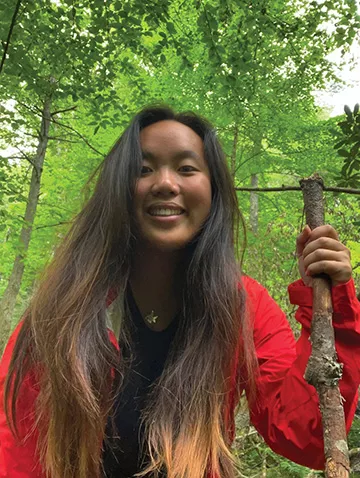Among the Fungus
How a “forest-hating hermit” came to love doing fieldwork in the woods.
This summer, I conducted research on the forked fungus beetle (Bolitotherus cornutus) at the Mountain Lake Biological Station in Pembroke, Virginia.
Generally, my workday consisted of doing fieldwork from 6:30 a.m. to 1:30 p.m. and working on my experiment from 1:30 p.m. until as late as 6 p.m.
In the mornings, I gallivanted around the woods looking at fungus brackets growing on logs and snags containing populations of beetles while recording data.
In the afternoons, I spent my time collaborating with a University of Virginia graduate student, Clara Stahlmann Roeder, on her dissertation. She is testing to see if there is a winner/loser effect among male forked fungus beetles, which occurs when a beetle’s chance of winning a fight is directly affected by their recent defeat or victory in a previous battle.
In other species, it has been demonstrated that recent victors have a higher chance of winning and losers will have a lower chance of winning after they have
just fought. However, this phenomenon had yet to be tested among our study species.
The experiment that I created examines whether neutral male beetles can detect whether another individual has won or lost a fight through chemical cues.
Before arriving at the station, I was studying abroad in the city of Granada, Spain, where everything was within walking distance and the only green space was a park. The thought of transitioning from that to living on the top of a mountain where the closest town was a 30-minute drive away was … intimidating.
I generally think of heavily wooded areas as being full of creepy crawlies like ticks, spiders, and mosquitoes—all of which I have an intense aversion to. The few days leading up to my arrival at Mountain Lake were filled with packing, purchasing After Bite, and worrying about my future living in wooded isolation as a forest-hating hermit.
To my surprise and delight, I had a rich social life interacting with all the brilliant scientists working here and found that there really weren’t as many mosquitoes as I’d imagined.
Being at Mountain Lake gave me the opportunity to connect with nature more deeply as I learned to appreciate the beautiful landscape around me, all the different species that live here, and the amount of complexity involved in studying them.
Published on: 10/23/2022
